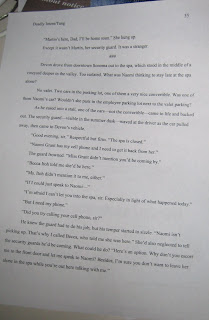Just write crap

It seems like this happens for every single book I write. I’m in the first quarter of the book, struggling to get the words down. It feels like slogging through New England clam chowder. Then I suddenly remember, it doesn’t have to be perfect. Just write crap. Edit later. Somehow I always forget this. It has happened at some point in every single manuscript I’ve completed. I have to remind myself to just get the words down, no matter how awful they are. The first couple thousand words really ARE crap, but then after that, my right brain creative side takes over and suddenly I’m writing words that are actually rather good. Or at least, words I wouldn’t shudder to read aloud to my mother, the English teacher. :) So if you’re in the first quarter or third of your book--or no matter where you are in it--just remind yourself to get the words down, no matter how execrable they are. Just power through it, don’t cringe at the triteness of your phrases and the cliches popping up like we...


